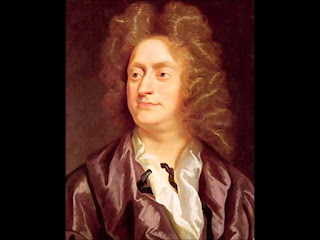Vocal Music
- Thou Knowest, Lord, the Secrets of Our Hearts – Henry Purcell (1659-1695)
- Solemn Melody – H. Walford Davies (1869-1941)
- Aria for Handbells - Dale Wood (1934-2002)
- Hymn 690 - Guide me, O thou great Jehovah (Cwm Rhondda)
- Hymn R249 - Great is thy faithfulness (Faithfulness)
- Hymn 686 - Come, thou fount of every blessing (Nettleton)
- Hymn 693 - Just as I am, without one plea (Woodworth)
- Hymn 411 - O bless the Lord, my soul (St. Thomas (Williams)
I was shocked (shocked, I tell you) when I noticed that I have not scheduled any music of Henry Purcell in the two-plus years I've been writing these notes on this blog. Born in 1659, Purcell is generally considered to be one of the greatest English composers; no other native-born English composer approached his fame until the 20th century's Edward Elgar.
 |
| Henry Purcell |
His father (also named Henry) was master of the choristers at Westminster Abbey. Though dad died when young Henry was but five, music had already taken hold of the young boy, and he became a chorister at the Chapel Royal. It’s said that he began composing at the age of 9, with his earliest known work an ode for King Charles’ birthday in 1670. He began studying with John Blow at the Chapel Royal, and by 20 had succeeded him as organist at Westminster Abbey. Legend has it that the elder musician stepped aside in recognition of the greater genius, and it is true that on Purcell's death in 1695 Blow returned to the post, and would write a noble Ode on the Death of Purcell. Purcell is buried next to the Westminster Abbey organ.
Purcell wrote secular and sacred music - odes for chorus and orchestra, cantatas, songs, catches, anthems, Services, chamber sonatas, keyboard works and incidental music for 49 plays. The largest part of his theatre music was composed during the last years of his life. It was during this period that he composed the chamber opera Dido and Aeneas, which is a very important landmark in the history of English dramatic music.
The anthem today is taken from the Music for the Funeral of Queen Mary, written by Purcell, for the funeral of Queen Mary II in 1695. She had died in December 1694, but her funeral was not until March 1695. Purcell composed a setting of the sixth of the seven sentences of the Anglican Burial Service (Thou Knowest Lord) for the occasion. The anthem was performed at his own funeral in November of the same year.
For some reason, people often mispronounce Purcell’s name. It’s “PUR-cell.” It should rhyme with “rehEARsal"
Not "Pure HELL"
 |
| Sir Henry Walford Davies |
But as a composer he is represented only by a few short works including some church anthems, the World War I favorite R.A.F. March Past, and this morning's opening voluntary, Solemn Melody. It first appeared in 1908 in a version for organ with a version for cello and orchestra a year later. It is in a simple song form. The tune is rich, warm, and flowing, and avoids either a feeling of British pomp or a sense of religiosity.
 |
| Dale Wood |
A way to Calvary leadeth from dark Gethsemane,
May every one behold him who weary walks that way.
The way doth lead to perfect bliss, but a way of pain it is
No comments:
Post a Comment
Note: Only a member of this blog may post a comment.